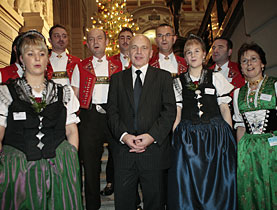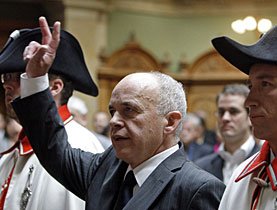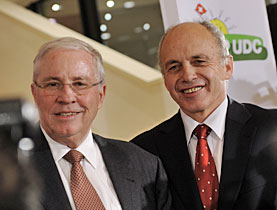Tension gives way to tradition in parliament

Days of hectic political scheming and speculation in parliament ended after a few tense hours on Wednesday with the election of Ueli Maurer to the federal cabinet.
And no sooner was the vote over than a group of men in traditional costumes struck up a yodel in the parliament building – a traditional and harmonious end to a tense and discordant election.
It was a performance in honour of next year’s Swiss President Hans-Rudolf Merz and came shortly after parliament had elected Maurer, a leading figure in the People’s Party, by the narrowest of margins.
The parliament lobby was bustling for several hours of the morning as parliamentarians, journalists and commentators squeezed around screens and microphones.
Most of them were wearing headphones and listening to the proceedings in the chamber where Senators and members of the House of Representatives had assembled for a special session to choose a successor to Defence Minister Samuel Schmid.
As night gave way to a grey morning and snow fell softly outside, the speaker announced the result of the first ballot. Maurer, the favourite, was more than 40 votes behind another parliamentarian put forward by the centre left in a challenge to the People’s Party.
In the wake of the announcement the party’s top candidate, Christoph Blocher, was withdrawn from the double ticket. As expected the controversial former justice minister had won no support outside his own party.
This allowed plenty of time for the estimated 300 journalists as well as politicians to comment on proceedings.
Round two ended with a cliffhanger result and Maurer still trailing behind the president of the main farmers association, Hansjörg Walter. But 20 minutes later the election – one of the highlights of this parliamentary session – was over.
Mixed reaction
Maurer pipped his rival by just one vote in the third ballot, making most people in his party happy and putting an end to its self-enforced opposition role after 12 months.
“I’m very pleased, because Maurer’s election can help boost cooperation with the centre-right parties,” said People’s Party parliamentarian Luzi Stamm.
The vote resulted in a few disappointed politicians among the centre left.
“It is sad that someone who has insulted political opponents for years and shown disdain for parliament was elected to the cabinet,” said Andreas Gross.
Over the past few days, the Social Democrat had launched an attempt to prevent Maurer’s election.
“We tried, but it did not work out. There has been a shift to the right today,” Gross said and shrugged his shoulders.
He had argued that Maurer was incompatible with Switzerland’s system of consensus and power-sharing politics.
Others wondered whether the former People’s Party president deserved a chance to show he could do better than Blocher, who was elected to the cabinet exactly five years ago. Blocher made little effort to integrate into the seven-member cabinet and lasted just four years before being voted out 12 months ago.

More
Consensus politics and power-sharing
Consensus
“It was not really about Maurer, but about whether consensus and power-sharing are the tenets of Swiss politics,” Iwan Rickenbacher, a senior political expert, told public television.
Stepping outside the parliament building where Christmas festivities were in full swing, it was snowing harder than ever.
The two protesters who had been waiting in the cold for hours to demand respect for human rights were still carrying their Green flags.
Two small cardboard placards warning against the election of Blocher or Maurer to the cabinet were attached to the mobile metal fence put up for the day – the 60th anniversary of the Universal Declaration of Human Rights.
swissinfo, Urs Geiser
Maurer has become the 111th cabinet member in Swiss history.
He takes over the defence ministry from Samuel Schmid on January 1, 2009.
Finance Minister Hans-Rudolf Merz will be Swiss president next year – a largely ceremonial post rotated in the seven-member cabinet.
The election of Maurer marks the return of the Swiss People’s Party to the government after a 12-month absence.
The party, which won 29% of the vote in last year’s parliamentary election, declared it was in opposition after the ousting of Justice Minister Blocher.
For about 50 years cabinet seats have been divided among the four main parties: the centre-right Radicals and Christian Democrats, the centre-left Social Democrats and the rightwing People’s Party.
The cabinet currently also has a member of the Conservative Democratic Party, launched earlier this year as a moderate splinter party, to counter the hardline policy of the People’s Party.

In compliance with the JTI standards
More: SWI swissinfo.ch certified by the Journalism Trust Initiative





You can find an overview of ongoing debates with our journalists here. Please join us!
If you want to start a conversation about a topic raised in this article or want to report factual errors, email us at english@swissinfo.ch.